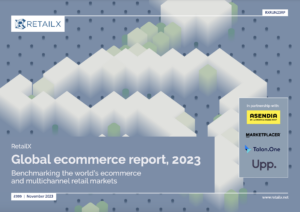Rising prices could be a fixed feature of the global economy in the years ahead, the latest RetailX Global ecommerce 2023 report has warned.
When inflation rates are high, 21st-century economic orthodoxy is clear – central banks should raise interest rates. This is because when interest rates are higher, people find it more expensive to borrow, so it encourages them to save. Higher interest rates dampen economic activity.
The current round of rate rises began from an abnormally low starting point because rates had been pushed down so far in the wake of the global economic crisis. The hope was that rates would rise quickly before also coming down quickly.
But thus far, that’s not what’s happening in many territories. Indeed, the idea that inflation could drop to 2% in the developed world anytime soon – the typical target set by governments – seems fanciful.
The bad news is that inflation may be here to stay. Leaving aside the argument that the idea of central banks setting interest rates to damp demand has long over-estimated the power of the institutions, there are several reasons to suspect this, which we will now consider in turn:
Global Heating
In 2023, global temperatures soared, caused in part by a strong El Niño. The World Meteorological Organization (WMO) has said that global temperatures will likely move more than 1.5°C above pre-industrial levels in the next five years. This breaches the threshold agreed under the 2015 Paris Climate Agreement.
It can be difficult to grasp what this might mean, but Simon Sharpe, a senior fellow at the non-profit World Resources Institute and former climate advisor to the UK government, recently made the point that a sustained warming of 2°C likely locks in sea level increases of 10m. The practical threshold for protecting London without building a huge wall around the city centre, he told New Scientist, is 5m. If things carry on as they are doing, central London may have to be abandoned as early as 2150.
It is not a great leap from this prediction to understanding why the World Economic Forum’s Global Risks Report 2023 identifies a “failure to mitigate climate change” as the biggest risk facing the world over the next decade. An underlying fear is that global heating will be accompanied by natural disasters, ecological breakdown, disputes over resources and increased migration flows.
Wages and prices tend to rise in step
One of the main reasons it is so difficult to squeeze inflation out of the system is that people who are being paid less push for pay rises to protect their living standards. In turn, this means businesses try to pass on the rise in wage costs by increasing prices. We are currently seeing this dance play out around the world. It’s worth noting that, in most countries, wage rises have been below inflation. Workers can be surprisingly reasonable. Nevertheless, it will still be some time before employees are able to get away with offering the kinds of low rises that were customary in the wake of the financial crisis.
A secondary point here is that the behaviour of those in positions of power matters. There was some resentment in the UK when, in 2022, the Bank of England’s governor, Andrew Bailey, called for wage restraint just as inflation was taking off and following the worst decade for average pay growth since the Napoleonic Wars.To be fair to Bailey, a refreshingly non-flashy and down-to-earth presence, he spoke clumsily, yet it wasn’t his best moment.
The lingering effects of 2008
While global leaders narrowly headed off another Great Depression in 2008-09, a side effect of pumping money into the system was that asset prices rose. A similar, if less pronounced, effect occurred the Covid-19 crisis when people who couldn’t spend their money on going out looked at the low interest rates then on offer and for places to put their cash instead. While a direct correlation would be hard to prove, you can’t help thinking it’s no coincidence that a peak in the prices of Banksy prints occurred in March 2021.
More seriously, there is evidence that many households are under huge strain because they have bought their biggest asset, a home, following a long term rise in house prices. A rise in interest rates for those with mortgages that are high in relation either to their borrowings or to their incomes – or the double whammy of both – can be especially difficult for such households. This limits the scope for central banks, fearful of causing a recession and negative equity if a house price downward spiral sets in, to raise rates.
Changing national economies
One of the reasons the 1990s were so benign economically for many in the developed world was because of the offshoring of production, most notably to China. This kept costs down, albeit at the expense of domestic jobs. In 2023, by contrast, the talk is centred on what The Economist has called Homeland Economics. Legislation such as Joe Biden’s Inflation Reduction Act, now a year old,is designed to onshore jobs.
Philosophically, you can also express this as a move from a just-in-time approach to the supply chain to one that’s been dubbed just-in-case. Proponents of the latter approach argue that it’s necessary because of volatility in global markets and because it helps to preserve the industrial base. Those against it argue that such protectionism has too many downsides.
Wherever you sit on this debate, there is certainly evidence that onshoring leads to inflation within developed economies due to manufacturing costs being higher in these nations. However, it is also worth noting that the effects of interventions are not always as long term as some fear. The renewables industry around the world has been heavily subsidised. However, the payback has been that wind and solar are now cheaper than fossil fuels, even to the extent where you could argue it’s the fossil fuel sector, which has long enjoyed tax breaks, that skews the market for energy.
Conflict
In 1973, the Yom Kippur War led to a hike in energy prices. Marking the 50th anniversary of the conflict for BBC Radio 4, the American journalist Michael Goldfarb argued that this comparatively brief event changed then world forever because the associated oil embargo brought the post-Second World War boom abruptly to a conclusion, and associated the rise of Regan and Thatcher.
It’s too soon yet to say whether recent events in the Middle East will have such profound consequences but at the very, least wars create uncertainty. Russia’s invasion of Ukraine was proof of this and we are living with its economic consequences.
For those in ecommerce and multichannel retail, what can be done to mitigate against inflation may be limited – and at least everybody else is in the same boat. The point remains, though, that inflation is not necessarily a blip. Better to prepare for the years ahead with this mind.
This feature was authored by Jonathan Wright and originally appeared in the RetailX Global ecommerce 2023 report. Download the full 250-plus page report, which offers a data-led analysis of the worldwide ecommerce and multichannel market.
One of RetailX’s flagship publications, it is aimed both at those already trading in different markets and at those considering expanding into regional markets where the challenge is to compete with established businesses.










